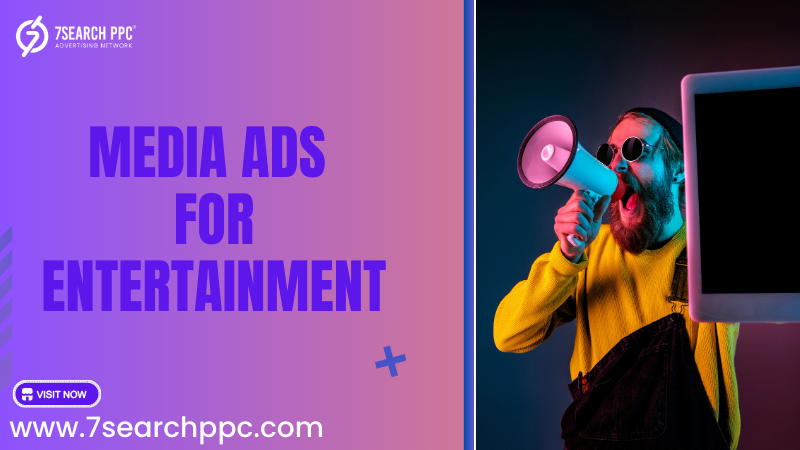The entertainment industry is evolving rapidly, driven by advancements in technology and changing consumer behavior. To stay ahead, brands and marketers must harness the potential of media ads. In 2024, media ads are more than just tools for promotion; they are vital strategies that connect audiences with compelling stories, unforgettable events, and immersive experiences.

What Are Media Ads in Entertainment?
Media ads refer to advertisements distributed through various media channels, such as digital platforms, television, radio, and print, aimed at promoting entertainment content. These ads play a crucial role in:
- Driving audience engagement.
- Creating brand awareness.
- Boosting ticket sales, subscriptions, and overall revenue.
In the entertainment sector, effective media ads combine creativity with data-driven insights to captivate diverse audiences, ensuring content resonates on multiple platforms.
Trends Shaping Media Ads in Entertainment in 2024
Personalized Advertising with AI and Machine Learning
Artificial intelligence (AI) and machine learning have transformed how brands deliver media ads. By analyzing user data, these technologies allow marketers to:
- Create highly targeted campaigns tailored to audience preferences.
- Predict content trends.
- Optimize ad delivery across various platforms.
For example, streaming platforms like Netflix and Spotify use AI-driven push ads to recommend shows, movies, and music, ensuring maximum user engagement.
Integration of Entertainment PPC Campaigns
Pay-per-click (PPC) advertising continues to dominate the digital ad space, offering measurable results for entertainment brands. Entertainment PPC campaigns:
- Focus on high-intent keywords such as “new movie trailers” or “live concert tickets.”
- Utilize visually appealing creatives to capture attention.
- Provide actionable data to refine future campaigns.
Platforms like Google Ads and social media networks make it easier for entertainment marketers to drive traffic and conversions with targeted PPC strategies.
Expansion of Video and Interactive Content
Video ads have long been effective in capturing audience attention. However, in 2024, the focus is shifting toward interactive video content. These ads encourage viewers to:
- Click on links.
- Participate in quizzes.
- Explore behind-the-scenes content.
Interactive ads offer entertainment brands unique opportunities to create memorable experiences, ensuring a deeper connection with their audiences.
Rise of Influencer Partnerships
Influencers remain powerful allies in entertainment marketing. By collaborating with popular social media personalities, brands can:
- Tap into dedicated fan bases.
- Amplify ad reach.
- Enhance credibility and trust.
Influencers can also help distribute media ads organically, driving higher engagement and ROI for campaigns.
Key Insights for Successful Media Ad Campaigns
Understanding Audience Behavior
Effective media ads rely on understanding the target audience’s preferences, habits, and pain points. Entertainment marketers can use tools like:
- Analytics platforms to track consumer behavior.
- Surveys and focus groups to gather feedback.
- Social listening tools to monitor trends.
Leveraging Multiple Ad Platforms
Diversification is crucial in maximizing ad reach. Entertainment brands must invest in:
- Social media channels (e.g., Instagram, TikTok, and Facebook).
- Streaming services and OTT platforms.
- Traditional media, such as radio and television.
Importance of an Entertainment Marketing Agency
Partnering with a specialized entertainment marketing agency can help brands navigate the complex media landscape. These agencies provide:
- Expertise in crafting tailored campaigns.
- Access to premium ad networks.
- Insights into emerging trends and audience dynamics.
Push Ads: Engaging Users in Real-Time
Push ads have gained significant traction in recent years. These notifications appear directly on users’ devices, offering:
- Instant engagement.
- High visibility.
- Personalized messages based on user behavior.
Push ads are particularly effective in promoting time-sensitive entertainment events like premieres or live shows.
Ad Platform Options for Entertainment in 2024
Social Media Platforms
Social networks are essential ad platforms for entertainment brands. They allow targeted advertising based on demographics, interests, and behaviors. Popular platforms include:
- Instagram and TikTok: Ideal for visually rich content.
- Facebook: Effective for multi-format campaigns.
- YouTube: A go-to platform for video ads and trailers.
Streaming and OTT Platforms
Streaming services like Hulu and Spotify offer advertising options tailored to entertainment brands. These platforms provide:
- High audience engagement.
- Innovative ad formats, such as sponsored playlists or pre-roll ads.
- Data-driven insights to refine campaigns.
Programmatic Advertising Networks
Programmatic advertising automates ad buying, ensuring efficiency and cost-effectiveness. This method enables brands to:
- Target audiences with precision.
- Adjust bids in real-time.
- Access premium inventory across various websites and apps.
The Role of Creativity in Media Ads

Designing Visually Compelling Ads
The visual appeal of media ads can make or break a campaign. Entertainment brands should focus on:
- High-quality graphics and videos.
- Eye-catching headlines.
- Clear calls-to-action (CTAs).
Storytelling: Connecting with the Audience
Storytelling remains a powerful tool in advertising. Media ads that convey a narrative:
- Evoke emotions.
- Build brand loyalty.
- Inspire action.
Using AR and VR for Immersive Experiences
Augmented reality (AR) and virtual reality (VR) are revolutionizing media ads. These technologies enable:
- Virtual concert experiences.
- Interactive movie trailers.
- Engaging previews of upcoming content.
Challenges in Media Ads for Entertainment
Ad Fatigue Among Audiences
With an overload of ads, consumers are becoming increasingly selective. To combat ad fatigue, brands must:
- Focus on quality over quantity.
- Deliver personalized content.
- Limit repetitive messaging.
Balancing Creativity with Data-Driven Strategies
While creativity is vital, it must align with data-driven insights. Entertainment marketers should:
- Use analytics to measure performance.
- A/B test ad creatives.
- Regularly update campaigns based on results.
Rising Competition and Costs
As more brands invest in media ads, competition and costs are escalating. To remain competitive, marketers need to:
- Explore alternative ad platforms.
- Optimize budgets effectively.
- Focus on unique selling points (USPs).
Conclusion
Media ads are pivotal in shaping the future of entertainment marketing. By embracing new technologies, leveraging diverse platforms, and focusing on creative storytelling, brands can connect with their audiences more effectively than ever before. As trends continue to evolve, staying adaptable and data-savvy will be the key to success in 2024.











